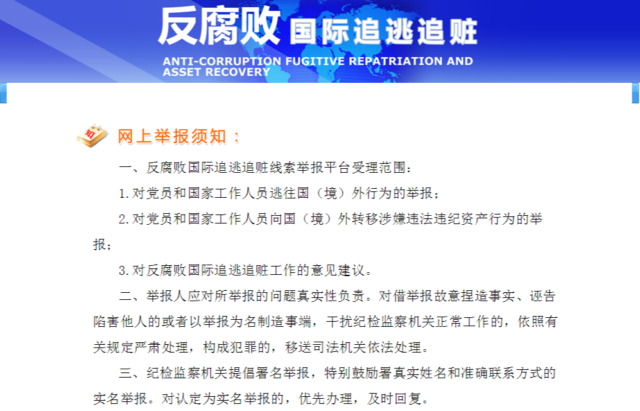Dec.9 marks the U.N. International Anti-Corruption Day. China’s top party watchdog has created a special section for tracking economic fugitives and recovering assets on its website. And it’s asking for the public to help.
The targets are Party members and officials who flee overseas, as well as attempts to transfer illegal assets and money overseas. The CPC Central Commission for Discipline Inspection wants reports and evidence of domestic and foreign locations of where corrupt officials are living, and those helping them, and any assets.
China has been engaged in a wide-reaching campaign to crack down on corruption since November 2012. Unofficial statistics show that nearly 60 officials of provincial and ministerial level or higher have been investigated for corruption or other serious disciplinary violations since then.

Zhou Yongkang
Among them is Zhou Yongkang, a former Standing Committee member of the Political Bureau of the CPC Central Committee. The former security chief was expelled from the Communist Party of China and has been subsequently arrested on Dec. 6th. (Read More: High-ranking Chinese Communist Party member arrested, expelled from party; Victor Gao discusses Zhou Yongkang’s expulsion from the Chinese Communist Party )

Xu Caihou
Another case is the fall of Xu Caihou, former vice chairman of the Central Military Commission. Xu was found to have taken advantage of his position to assist in the promotion of others, accepting huge bribes personally and through his family, and to have sought profits for others in exchange for bribes. Xu is now facing prosecution. (Read more: Former Chinese military official expelled from Communist Party )

China’s anti-corruption efforts yield results
Meanwhile, China’s co-operation with the international community to fight against corruption is in full swing. A US State Department official says China has provided a name list of economic fugitives now hiding in the US. China and the US have nailed down a definite number and agreed to address them case by case. Finally to wrap up, check this graphic for the latest achievements in China’s high-profile anti-corruption campaign.

UN urges all member states to “break corruption chain”
The fight against corruption is a global concern requiring the broadest possible response to ” dismantle its high walls,” U.N. Secretary-General Ban Ki-moon said Tuesday in a message marking the International Anti-Corruption Day.
“To dismantle corruption’s high walls, I urge every nation to ratify and implement the UN Convention against Corruption,” said the secretary-general, underscoring that while the treaty’s ground breaking measures in the areas of prevention, criminalization, international cooperation and asset recovery have made important inroads, “there is much more to do.”
Corruption is a complex social, political and economic phenomenon that affects all countries. Corruption undermines democratic institutions, slows economic development and contributes to governmental instability.
The 193-nation General Assembly designated Dec. 9 as International Anti-Corruption Day, to raise awareness of corruption and of the role of the Convention in combating and preventing it. The Convention entered into force in December 2005.
On Oct. 31, 2003, the U.N. General Assembly adopted the United Nations Convention against Corruption and requested that the secretary-general designate the United Nations Office on Drugs and Crime (UNODC) as secretariat for the Convention’s Conference of States Parties.
The theme of the 2014 International Day, “Breaking the Corruption Chain,” is geared toward showing the importance of individual engagement in tackling a phenomenon “that strikes hardest at the poor, hinders inclusive economic growth and robs essential services of badly needed funds.”
“From cradle to grave, millions are touched by corruption’s shadow,” Ban said, urging engagement of the public and private sectors. Public servants and elected officials had to be guided by ethics, transparency and accountability, while the private sector needed to recognize that good behavior is good business.
Looking ahead to agreement on a new post-2015 sustainable development agenda, Ban emphasized how the new agenda would promote better practices.
“Our aim is to empower individuals and catalyze governments, the private sector and civil society to help lift millions out of poverty, protect the planet and achieve shared prosperity and dignity for all,” he said, adding that “eliminating corruption and its harmful impacts will be crucial to our future well-being.”
Yury Fedotov, executive director of the UNODC, also remarked on the campaign, calling on everyone to mark the International Day with events, to use the Call to Action Matrix, and to spread the word through social media.
Outlining corruption’s reach into “boardrooms, government, law enforcement, education, healthcare and sport” among other areas, he stressed the practices destructive effects, especially on the poor.
“Corruption, today, represents a serious brake on the forward motion of sustainable development and building effective institutions,” Fedotov said, adding that corruption “oils the wheels of other damaging crimes, including illicit trafficking in drugs, people, animals, timber and guns.”
Echoing the secretary-general, he said global resistance to corruption hinged on worldwide ratification and implementation of the UN anti-corruption convention, together with participation in the treaty’s peer review mechanism, and he pointed to the tools’ transformational effects.
“These range from meaningful reform to the strengthening of anti-corruption institutions all over the world,” he said.
Touching upon next year’s Sixth Conference of the States Parties to Convention, which will be held in St. Petersburg, Russia, Fedotov said the meeting would offer “an opportunity to further strengthen global anti-corruption action and deliver the message that corruption has no place in our world.”
This story is compiled with information from Xinhua News.
 CGTN America
CGTN America
